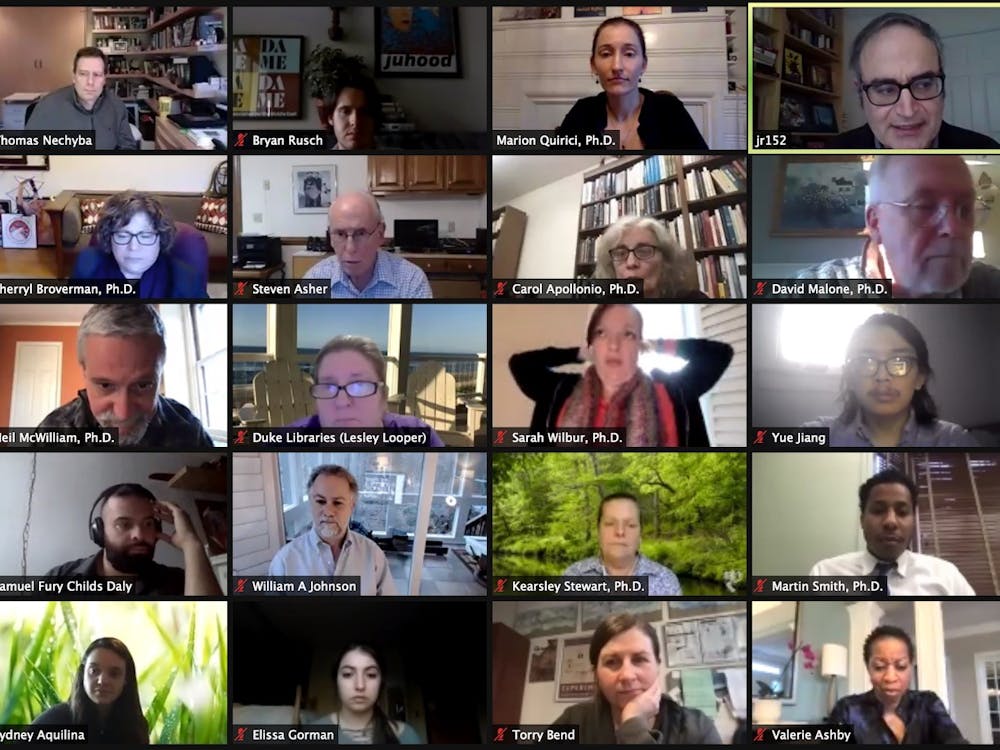Faculty heard two proposals from professors in the Nicholas School of the Environment at Wednesday's virtual meeting of the Arts and Sciences Council, Trinity College of Arts and Sciences' faculty governance body.
The first proposal would rename the current earth and ocean sciences major to earth and climate sciences, while keeping the current option for students to choose between a Bachelor of the Arts and a Bachelor of Science path.
"The new emphasis on climate in the earth and climate sciences and the marine sciences and conservation [majors] will be a bit more targeted in terms of what students are looking for and what we may be able to provide to them," said Toddi Steelman, Stanback dean of the Nicholas School.
A marine sciences and conservation major, which does not currently exist, would be added by the second proposal up for discussion at the meeting. That major would become the third undergraduate major taught out of the Nicholas School, joining the potentially soon-to-be-renamed earth and climate sciences and the environmental sciences and policy program. The proposal would also add a marine sciences and conservation minor.
According to Steelman's presentation, the revamped Earth and Climate Sciences major would include a new 200-level field work class. The Nicholas School's field work options already include trips to Yellowstone National Park, Hawaii and the Outer Banks, Steelman noted.
While the Nicholas School of the Environment is independent from Trinity, Trinity still oversees undergraduates taking courses of study within the school, just as it does with the Sanford School of Public Policy. Therefore, new undergraduate programs of study—in this case, majors and minors—related to those schools still go through the Arts and Sciences Council.
Andrew Read, Stephen A. Toth professor of marine biology and the director of the Duke Marine Lab, discussed the proposal to add the new marine sciences and conservation major. He said the major would help take advantage of the marine lab—located in Beaufort, N.C.—which he said sets Duke apart from other schools.
"Right now the landscape for students interested in marine sciences is pretty confusing at Duke," Read said. "We think this will provide a clearer pathway forward for those students and for students interested in coming to Duke to study marine sciences.”
The major would start with an introductory class—Humans and Changing Oceans—and follow with three core classes, five electives, and one capstone or thesis. Although there wouldn't be a formal requirement that students spend a semester at the Marine Lab, it would be encouraged.
Ron Grunwald, senior lecturer of biology, wrote in the Zoom chat that the hope is that the new major would attract students who otherwise choose not to come to Duke.
"We see a few dozen prospective students in biology each year with a primary interest in Marine Science. Many don't come, for lack of a major," Grunwald wrote. "The MSC major should help catch them."
Votes on the two proposals were not scheduled for Wednesday, and discussion will continue in two weeks at the Arts and Sciences Council's next meeting, said José María Rodríguez García, associate professor of romance studies and chair of the council.
New Course Evaluations?
The council also heard a report on potential changes to course evaluations from the Arts and Sciences Committee on Assessment.
The committee is chaired by Professor of Economics Thomas Nechyba and also includes four other faculty members and Jennifer Hill, director of the Trinity Office of Assessment. The group met throughout the fall to develop a consensus framework to improve Trinity's course evaluations setup.
Those changes are possible because Duke recently signed a contract for new course evaluation software, Nechyba said, adding that a potential new system would preferably follow a handful of guidelines that the committee came together over.
The focus of the group's recommendations is to increase response rates from students and make the evaluations more useful to both professors and students.
One option for increasing response rates is to change the current opt-in system—where evaluations are optional, although encouraged—to one where students have to choose not to complete the forms. For example, final course grades could be withheld until students either complete the evaluations or indicate that they don't want to, Nechyba said, although he noted that that's only one option, rather than a recommendation.
Among other ways to convince students that evaluations are useful, including training modules, course evaluations could be made public to students to give them advance information about a class or a professor.
"Currently students heavily use RateMyProfessor.com, where only extreme, certainly not representative, views get voiced," Nechyba said.
The alternative could be to provide more representative information to students, although professors would be able to opt out of having evaluations made public.
Accessible classrooms
The council also heard a presentation from students and faculty about Duke's accessibility for students with disabilities, and lessons to take from the pandemic to apply in classrooms going forward.
Marion Quirici, lecturing fellow of the Thompson Writing Program, co-runs the Disability and Access Initiative at Duke. She discussed lessons from the pandemic that can improve classes' accessibility for students—both students with known disabilities and without—including Zoom access, flexible deadlines and flexible grading.
Keeping these options open is particularly important, given that "the population of students with disabilities is also a lot larger than you might assume," she said.
Senior Sydney Aquilina noted that getting documentation for disabilities is often expensive, with many students coming in without any formal recognition. Therefore, keeping overall accessibility in mind is important, rather than on a case-by-case basis.
Get The Chronicle straight to your inbox
Signup for our weekly newsletter. Cancel at any time.

